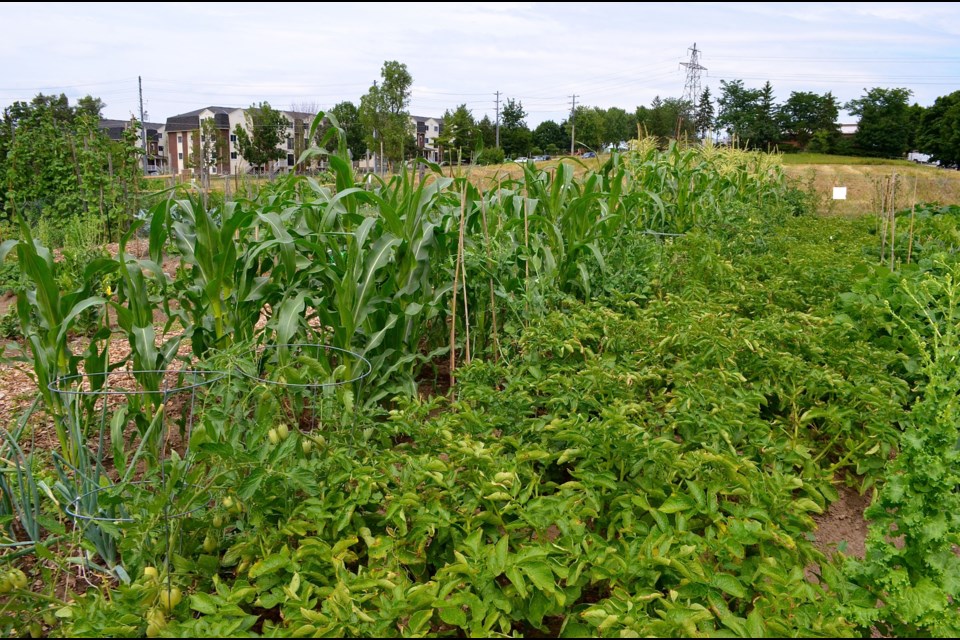The City of Guelph is seeing record numbers of applications from neighbourhood groups wanting to establish community gardens on city property.
“In the past several years we’ve had one a year so, this is a huge undertaking for us to have four,” said Dave Beaton, program manager, trails and natural areas stewardship for the city. “These four proposals for city properties will be the largest expansion of community gardens in city history.”
If all the applications are approved it will increase the number of gardens on city property by 50 per cent.
“There are eight community gardens on city property and overall 29 places where people can grow food together, “ said Beaton. “It can happen in parks, schools and church properties. Those are all part of the broader community gardens network.”
The passion for growing is growing.
“Guelph is a food city,” he said. “All the gardens tend to be full every year and this will continue to expand the range and the locations. These four gardens are in four different wards. So, they are all over the city.”
The applications are for new community gardens in St. George’s Park, Mollison Park, Burns Drive Park and Stephanie Drive Park.
“In the fall of last year the city opened requests for proposals to the public and four different groups representing potential community gardeners made proposals to put gardens in those four parks,” said Beaton. “We did a vet and we are now putting it out for community engagement.”
The community consultation period will run until Feb 14 and people can review the applications and provide input by visiting haveyoursay.guelph.ca
“After that process we will compile that feedback,” said Beaton. “It will be collected and analysed and then we will provide a decision whether to go forward with each garden proposal.”
Applicants must demonstrate adequate support and commitment by a group of people to maintain the garden.
“Often they are somehow connected with an existing neighbourhood group, not always but it can’t be a single person,” said Beaton. “It has to be a group so there is a collective responsibility for it. We want these to be successful for the long term.”
The proposed site of a garden can’t disturb existing infrastructure or interfere with compatible use of the park.
“For example if someone proposed it right over a community ice rink we wouldn’t consider that because it wouldn’t be a compatible use,” said Beaton. “Most of the time we know how things are being used.”
Access to a municipal water source is essential.
“The water supply is the big thing,” said Beaton. “We really are only entertaining them where either we have a rink vault or there is some other access to water that has been determined because that is critical to the success of a garden.”
Applications for new gardens must be submitted to the city before the end of October.
“The process is available on our website at guelph.ca/communitygardens,” said Beaton. “It has a map of all the existing gardens and a link to all the existing garden leaders. It’s got what you need to do if you want to propose a new garden.”
If the garden is approved the city will supply access to municipal water and help prepare the site.
“We do the initial work to till the property to make sure we get rid of the turf,” said Beaton. “We also bring them mulch and supply them with rain barrels so they can access a hose from the waterworks group.”
It is then up to the community group to manage the garden and share in the harvest as they see fit.
“There are traditional community gardens which are plot based where you grow food in your plot,” said Beaton. “There are communal gardens where people grow food collectively for either everyone to take or for donation or charity. Often there is some form of hybrid where there is a collective portion of it that might be donated and a part that is more of a pollinator garden.”
Guelph has examples of all these methods directed by a variety of groups and individuals
“It’s important for people to know that community gardens are growing in popularity due to concerns about climate change and people wanting to get involved in their community,” said Beaton. “Community Gardens provide great places for people to connect with neighbours, and to improve their physical and mental health. They are also great for being able to provide healthy, delicious food that is accessible for everyone.”



